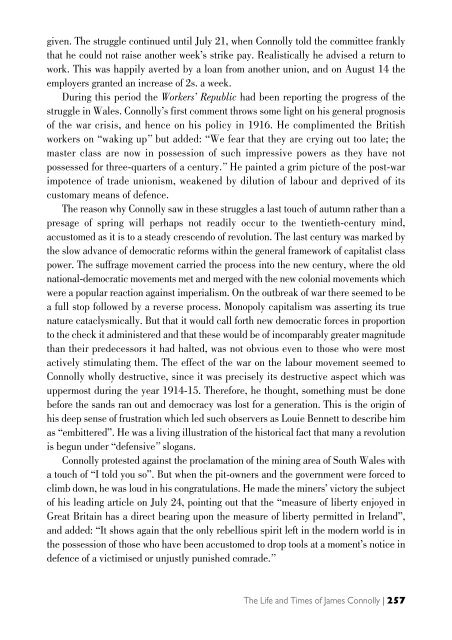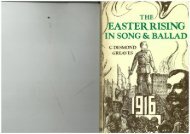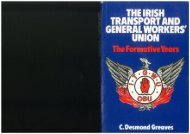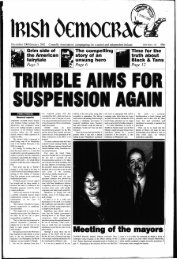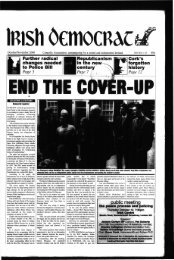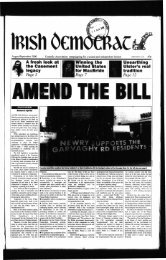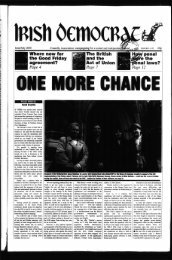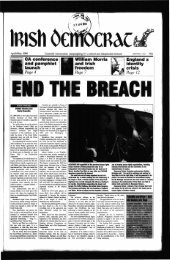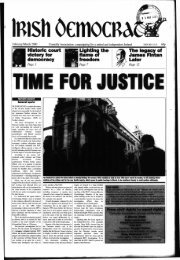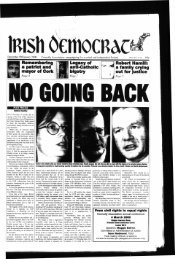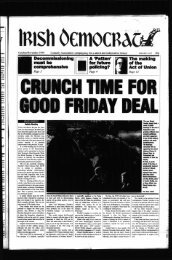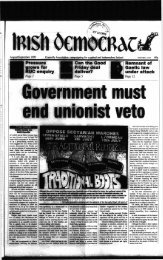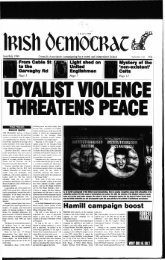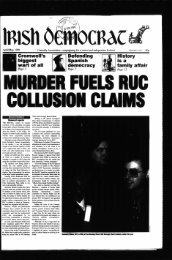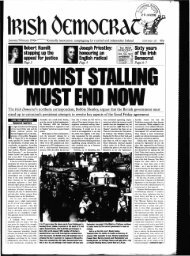Create successful ePaper yourself
Turn your PDF publications into a flip-book with our unique Google optimized e-Paper software.
given. <strong>The</strong> struggle continued until July 21, when <strong>Connolly</strong> told the committee frankly<br />
that he could not raise another week’s strike pay. Realistically he advised a return to<br />
work. This was happily averted by a loan from another union, <strong>and</strong> on August 14 the<br />
employers granted an increase <strong>of</strong> 2s. a week.<br />
During this period the Workers’ Republic had been reporting the progress <strong>of</strong> the<br />
struggle in Wales. <strong>Connolly</strong>’s first comment throws some light on his general prognosis<br />
<strong>of</strong> the war crisis, <strong>and</strong> hence on his policy in 1916. He complimented the British<br />
workers on “waking up” but added: “We fear that they are crying out too late; the<br />
master class are now in possession <strong>of</strong> such impressive powers as they have not<br />
possessed for three-quarters <strong>of</strong> a century.” He painted a grim picture <strong>of</strong> the post-war<br />
impotence <strong>of</strong> trade unionism, weakened by dilution <strong>of</strong> labour <strong>and</strong> deprived <strong>of</strong> its<br />
customary means <strong>of</strong> defence.<br />
<strong>The</strong> reason why <strong>Connolly</strong> saw in these struggles a last touch <strong>of</strong> autumn rather than a<br />
presage <strong>of</strong> spring will perhaps not readily occur to the twentieth-century mind,<br />
accustomed as it is to a steady crescendo <strong>of</strong> revolution. <strong>The</strong> last century was marked by<br />
the slow advance <strong>of</strong> democratic reforms within the general framework <strong>of</strong> capitalist class<br />
power. <strong>The</strong> suffrage movement carried the process into the new century, where the old<br />
national-democratic movements met <strong>and</strong> merged with the new colonial movements which<br />
were a popular reaction against imperialism. On the outbreak <strong>of</strong> war there seemed to be<br />
a full stop followed by a reverse process. Monopoly capitalism was asserting its true<br />
nature cataclysmically. But that it would call forth new democratic forces in proportion<br />
to the check it administered <strong>and</strong> that these would be <strong>of</strong> incomparably greater magnitude<br />
than their predecessors it had halted, was not obvious even to those who were most<br />
actively stimulating them. <strong>The</strong> effect <strong>of</strong> the war on the labour movement seemed to<br />
<strong>Connolly</strong> wholly destructive, since it was precisely its destructive aspect which was<br />
uppermost during the year 1914-15. <strong>The</strong>refore, he thought, something must be done<br />
before the s<strong>and</strong>s ran out <strong>and</strong> democracy was lost for a generation. This is the origin <strong>of</strong><br />
his deep sense <strong>of</strong> frustration which led such observers as Louie Bennett to describe him<br />
as “embittered”. He was a living illustration <strong>of</strong> the historical fact that many a revolution<br />
is begun under “defensive” slogans.<br />
<strong>Connolly</strong> protested against the proclamation <strong>of</strong> the mining area <strong>of</strong> South Wales with<br />
a touch <strong>of</strong> “I told you so”. But when the pit-owners <strong>and</strong> the government were forced to<br />
climb down, he was loud in his congratulations. He made the miners’ victory the subject<br />
<strong>of</strong> his leading article on July 24, pointing out that the “measure <strong>of</strong> liberty enjoyed in<br />
Great Britain has a direct bearing upon the measure <strong>of</strong> liberty permitted in Irel<strong>and</strong>”,<br />
<strong>and</strong> added: “It shows again that the only rebellious spirit left in the modern world is in<br />
the possession <strong>of</strong> those who have been accustomed to drop tools at a moment’s notice in<br />
defence <strong>of</strong> a victimised or unjustly punished comrade.”<br />
<strong>The</strong> <strong>Life</strong> <strong>and</strong> <strong>Times</strong> <strong>of</strong> <strong>James</strong> <strong>Connolly</strong> | 257


